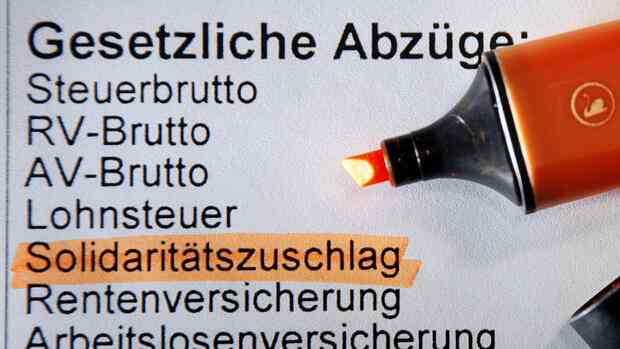On Tuesday, the future of the Soli was negotiated before the Federal Fiscal Court. A decision should follow at the end of January.
(Photo: dpa)
Berlin Once again, the judiciary is supposed to solve a tax policy problem because politicians are not in a position to do so. On Tuesday, the Federal Fiscal Court negotiated the question of whether the solidarity surcharge is still constitutional. In a test case by the taxpayers’ association, a couple is resisting having to continue paying the tax, even though Solidarity Pact II expired at the end of 2019.
Ultimately, the Federal Constitutional Court will probably have to answer this question. In recent years, Karlsruhe has repeatedly served as a repair shop for tax policy – be it with the fuel element tax, the inheritance tax or the property tax. Is that repeated with the solos? Constitutional law experts judge the chances of the plaintiffs differently.
Politics would definitely have deserved such a judicial rebuke. Even the Federal Minister of Finance does not want to defend the current regulation in court. Politically it is understandable. In the traffic light coalition negotiations, the Liberals were unable to push through their wish for a complete abolition of the Solis. Now they hope that the judges will do the work. Nevertheless, the signal that a finance minister does not want to insist on the legality of a tax law is significant.
>> Read also: The Soli Annoyance – Who would benefit from the end of the surcharge
Top jobs of the day
Find the best jobs now and
be notified by email.
In the case of the solidarity surcharge, the inability to reform tax policy is once again evident. Abolition is overdue. First introduced to finance the costs of the Iraq war, then for the reconstruction of the East, its justification has long been obsolete. And actually, the federal government has long since realized why it will abolish the solos for 90 percent of taxpayers from 2021.
This compromise by the grand coalition has made the solos even more dubious. Now it is continued as a disguised tax on the wealthy for top earners and companies. It is entirely understandable that the SPD has difficulties in relieving this group. But then the clean solution would be integration into the income tax rate.
But neither the grand coalition nor the traffic light alliance could agree on such a step. And so there has been a standstill in tax policy for a long time, although a fundamental reform of the tax rate, which focuses on reducing the burden on lower and middle incomes, is overdue. But perhaps the impetus for this must come from Karlsruhe with a soli verdict.
More: The most important questions and answers about solos.
